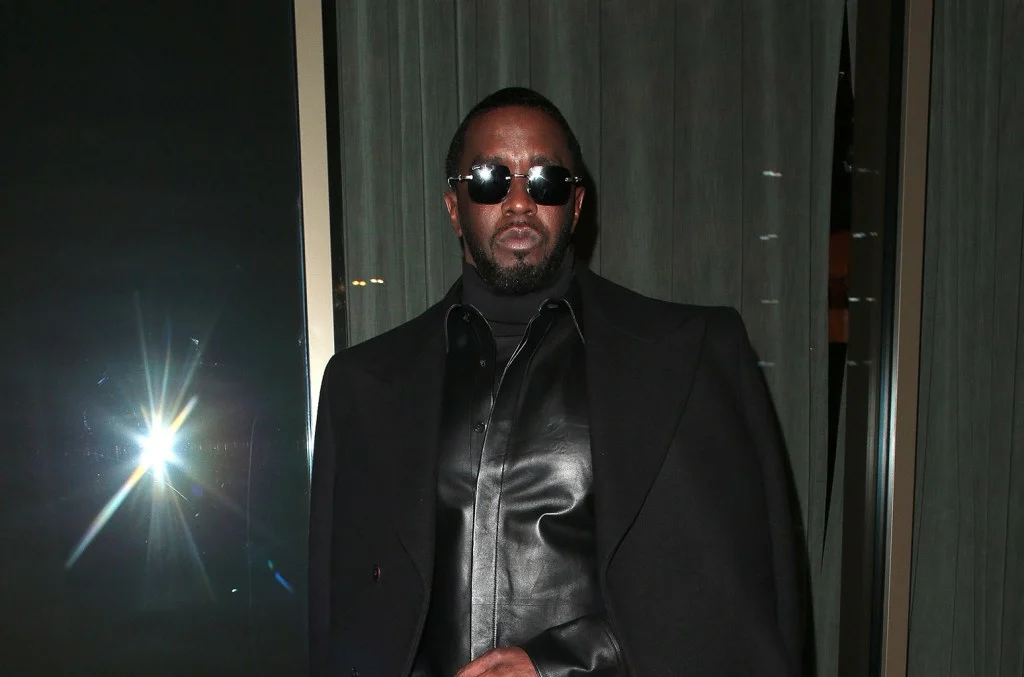Legal
Page: 14

Jamie Foxx is not pulling punches when it comes to his thoughts on the Sean “Diddy” Combs‘ New York sex trafficking and racketeering trial. During a recent appearance at the Comedy Store in Los Angeles, the actor/singer lashed out at the disgraced former music mogul who he once honored at Diddy’s 2008 Hollywood Walk of Fame induction ceremony.
“Diddy is fu–in’ crazy, huh?” Foxx said in footage shared by Urban Hollywood. “I don’t know if he is going to jail, but he is a nasty motherf–er. Am I right? Especially for us… white people like, ‘It’s cool,’ but for Black people… that was our hero. All that g–damn baby oil, boy! Why you so nasty, Diddy?” When officers raided Combs’ homes in Los Angeles and Miami last March prosecutors said they found drugs as well as more than 1,000 bottles of lubricant and baby oil.
The comments from Foxx about the shocking testimony in the Combs trial in reference to the rapper’s marathon “Freak Off” sex parties is relevant because in 2023 rumors circulated that Combs allegedly poisoned Foxx, leading to the actor’s hospitalization for what was later confirmed to be a stroke.
Foxx opened up about the rumors surrounding his mystery illness last month in a chat with The Hollywood Reporter, shooting down the allegations that Diddy tried to have him killed via poisoning. “I’m in f—ing perfect shape. [I saw things like,] ‘Puffy tried to kill me.’ No, Puffy didn’t try to kill me. When they said I was a clone, that made me flip,” Foxx said. “I’m sitting in the hospital bed, like, ‘These b—h-a– motherf—ers are trying to clone me.’”
While a spokesperson for Combs did not reply to Billboard‘s request for a comment on the allegations, his team has repeatedly said the rumor was false and unfounded.
Foxx also addressed the allegations in his What Had Happened Was… Netflix special in December, in which he said, “The internet said Puffy was trying to kill me, that’s what the internet was saying. I know what you thinking, ‘Diddy?’ Hell no, I left them parties early. I was out by 9. ‘Something don’t look right… it looks slippery in here!” The Combs trial is in its fourth week and on Wednesday (June 4) Bryana Bongolan, a friend of Diddy’s ex, prosecution star witness Cassie Ventura, alleged that Diddy dangled her over a 17th-floor apartment balcony in 2016 before shoving her into the balcony’s furniture.
Combs is facing five criminal counts of racketeering conspiracy, sex trafficking by force, fraud or coercion and transportation to engage in prostitution, charges that could land him in prison for the rest of his life; Combs has denied the allegations against him.
One of Cassie Ventura’s friends testified Wednesday that Sean “Diddy” Combs dangled her over a 17th-floor balcony, telling jurors that the incident left her with “night terrors and paranoia.”
On the witness stand during the fourth week of the music mogul’s sex-trafficking trial, Bryana Bongolan said she had been at Ventura’s apartment in 2016 when Combs stormed in unexpectedly, according to CNN. She told the jurors that the star dangled her over a balcony, then threw her into furniture.
The attack left her with injuries both physical and psychological, Bongolan said: “I have night terrors and paranoia and scream in my sleep at times.”
Bongolan is one of many witnesses already called by prosecutors, who claim Combs ran a criminal enterprise aimed at coercing Ventura and other women into participating in drug-fueled sex shows known as “freak-offs.” Defense attorneys have said the sex was consensual and that Combs merely operated a legitimate music business.
The alleged balcony incident has long been one of the flashiest accusations against Diddy. It was referenced in Ventura’s civil lawsuit that sparked the rapper’s downfall, and prosecutors mentioned it in the indictment and in other pre-trial court filings. Bongolan herself described it in detail in a civil lawsuit she filed last year.
On the witness stand Wednesday, she described it for jurors, saying it had left her with “a bruise on the back of my leg and back and neck pain.”
Bongolan also testified that she once saw Diddy throw a knife at Ventura, and about another time that she saw Cassie with a black eye. She also told jurors about an alleged incident at a photoshoot in which Combs threatened her life.
“He came up really close to my face and said something around the lines of, ‘I’m the devil and I could kill you,’” Bongolan said.
Combs was indicted in September, charged with running a sprawling criminal operation aimed at facilitating the freak-offs — elaborate events in which Combs and others allegedly coerced Ventura and other victims into having sex with escorts while he watched and masturbated. Prosecutors also say the star and his associates used violence, money and blackmail to keep victims silent and under his control. (Read Billboard‘s full explainer of the case against Diddy here.)
Once one of the music industry’s most powerful men, Combs is accused of racketeering conspiracy (a so-called RICO charge), sex trafficking and violating a federal prostitution statute. If convicted on all of the charges, he faces a potential sentence of life in prison.
The trial, which has already featured testimony from Ventura herself, another unnamed victim named Mia and numerous other witnesses, is expected to run until early July. Bongolan is expected to continue testifying in the afternoon.
Jimmy Buffett’s widow has filed a court petition asking to replace her co-trustee on the late singer-songwriter’s $275 million estate, saying a business manager tapped to handle the assets has been “openly hostile and adversarial” while ignoring her requests for financial transparency.
The petition was filed Tuesday (June 3) by the late singer’s wife of 46 years, Jane Buffett, who married Jimmy Buffett in 1977 and was made sole beneficiary of a marital trust holding the bulk of the hitmaker’s assets upon his death in September 2023 at the age of 76. The court filing says these assets, including real estate and a 20% stake in his successful island-themed hospitality company Margaritaville, are worth roughly $275 million.
Jimmy’s will named Rick Mozenter, an accountant at the business management firm Gelfand Rennert & Feldman, as co-trustee to help Jane administer the estate. But Tuesday’s petition says that rather than help Jane, Mozenter has actually made life more difficult following her husband’s death.
Trending on Billboard
“Mr. Mozenter has failed to perform even the most basic tasks required of him in his role as co-trustee, including providing Mrs. Buffett with information concerning trust assets and finances, which has left Mrs. Buffett in the dark with regard to the state of her own finances,” write Jane’s lawyers from the firm Sullivan & Cromwell. “Along the way, Mr. Mozenter has belittled, disrespected and condescended to Mrs. Buffett in response to her reasonable requests for information she undoubtedly was entitled to receive.”
According to the court filing, Jane met with Mozenter a month after Jimmy’s death in October 2023 and asked how much income she should expect to receive annually from the trust. Mozenter dragged his feet for 16 months, Jane’s lawyers say, repeatedly ignoring her requests to get an answer as she tried to make plans for her future.
Mozenter finally provided this estimate in February 2025, and the results were “shocking.” Mozenter told Jane she would see less than $2 million in annual income — an amount that would not cover Jane’s expenses and “a remarkably poor return for a trust with an estimated $275 million in assets,” the petition states.
Jane’s lawyers say this estimate was especially surprising because the trust had received more than $14 million in distributions from Margaritaville over the previous 18 months. This made Jane concerned that Mozenter was mismanaging the trust and she requested additional financial information from him, but the accountant once again stonewalled.
The court filing also claims Mozenter has been “unprofessional and combative” to Jane and that he refused her request to sell a piece of Bahamas real estate, even though the Buffett family rarely uses this property and its costs more than $300,000 a year to operate. Mozenter has billed more than $1.7 million in fees while engaging in this alleged wrongdoing, Jane’s attorneys claim.
“Faced with what clearly has become an unsolvable rift with Mr. Mozenter, and the prospect of having to continue to unsuccessfully request that he discharge his duties, on May 30, 2025, Mrs. Buffett asked that Mr. Mozenter resign as co-trustee,” says the petition. “Mr. Mozenter refused, insisting that he remain in a position of authority over her wealth. The situation is untenable and Mrs. Buffett requests this court’s assistance to resolve it.”
Jane’s lawyers are asking a judge to remove Mozenter from the trust and replace him with a new co-trustee. The petition suggests Daniel Neidich, the CEO of investment firm Dune Real Estate Partners, for the job.
Mozenter did not immediately respond to a request for comment on the petition.
THE BIG STORY: Is the music industry’s billion-dollar legal battle over artificial intelligence suddenly going to be over before it starts? I wouldn’t count on it just yet.
News broke this weekend that Universal Music, Warner Music and Sony Music were each in talks to license their songs to Suno and Udio for use in training AI models to spit out new songs – less than a year after the music companies filed blockbuster copyright cases accusing the AI startups of stealing music on an “unimaginable scale.”
Both sides have framed those cases as an existential fight over the future of music. The labels says Suno and Udio are “trampling” the rights of real musicians in an effort to replace them; the startups argue back that the music giants are abusing intellectual property to crush a new technology that threatens their market share.
Trending on Billboard
Is an actual deal imminent? I’d lean toward no. Low-boil settlement talks are a common and continuous feature of almost any litigation, and it’s unclear exactly how far they’ve gotten here. The labels have long said they’re open to listening, but striking a final deal – rather than just discussing one in broad strokes – will require solving a long list of incredibly complex problems, as my colleague Kristin Robinson writes.
The choice confronting the music giants in these talks – to strike a deal or fight it out in court – is one facing all creative industries amid the rise of artificial intelligence. If you sell your content to AI firms, you earn short term profits…by empowering a technology that might destroy you in the long run. If you fight it out, you risk being left behind amid a technological revolution, all for what could be a losing cause.
For the music business, history makes that an especially grueling choice. Nobody wants a replay of the 2000s, when labels chose to fight an ascendant new technology in court rather than harness and exploit its potential for profit. Only when the majors opted to partner with streamers like Spotify – in equity stake deals eerily similar to those being discussed with Suno and Udio – did the industry begin the long climb to recovery.
But digital music merely represented a new distribution system, and one where the tech partners would ultimately always need to pay real musicians for their output. If the labels end these lawsuits by handing over their catalogs for AI training now, those new partners might one day no longer need them at all.
You’re reading The Legal Beat, a weekly newsletter about music law from Billboard Pro, offering you a one-stop cheat sheet of big new cases, important rulings and all the fun stuff in between. To get the newsletter in your inbox every Tuesday, go subscribe here.
Other top stories this week…
LIZZO’S APPEAL – Lizzo’s lawyers launched an appeal aimed at ending a sexual harassment lawsuit filed by her former backup dancers, calling it an “attack” on her “First Amendment right to perform her music and advocate for body positivity.” Lizzo’s attorneys say her behavior toward the dancers was clearly part of her artistic approach — and thus shielded by constitutional protections for free speech.
SHADY FACEBOOK MUSIC? – Eight Mile Style, a company that owns much of Eminem’s catalog, filed a copyright lawsuit against Meta over accusations that Facebook and Instagram made “Lose Yourself” and other iconic tracks available to billions of users without permission. The case claimed that the social media giant added Eminem’s songs to its music library without the necessary licenses, violating copyright law on a “massive” scale in the pursuit of “obscene monetary benefit.”
OFFENSE AS DEFENSE – Smokey Robinson filed a countersuit against four longtime housekeepers who recently accused him of rape, claiming the allegations were part of an “extortionate scheme” by the women and their attorneys. The Motown legend accused the women and their lawyers of defamation, invasion of privacy, civil conspiracy and even elder abuse over the “fabricated” allegations.
YOUNGBOY PARDONED – President Donald Trump granted a pardon to YoungBoy Never Broke Again, who was released from prison in April after pleading guilty last year to a single count of possession of firearms by a convicted felon. The rapper, who has faced legal trouble for years, thanked the president on social media: “This moment means a lot. It opens the door to a future I’ve worked hard for and I am fully prepared to step into this.”
TRAFFIC DEATH – Ex-Red Hot Chili Peppers guitarist Josh Klinghoffer reached a plea deal with prosecutors to avoid prison time after striking and killing 47-year-old Israel Sanchez with his car in Los Angeles last year. Under the terms of the deal, the rocker pleaded no contest to misdemeanor vehicular manslaughter without gross negligence and was sentenced to one year of informal probation and 60 days of community labor.
SPOUSAL SUPPORT – Offset updated his divorce filings to demand that his estranged wife Cardi B pay him spousal support after their split is finalized. In an amended version of his answer to Cardi’s divorce petition, the Migos star added a request for an unspecified amount of alimony, but remains unchanged otherwise. The pair of superstars are one year into an increasingly acrimonious divorce case following six years of marriage.
BILLION WITH A B – The Justice Department urged the U.S. Supreme Court to tackle a billion-dollar lawsuit over music piracy filed by the major labels against Cox Communications, warning that a “sweeping” ruling could force internet providers to cut off service to many Americans. The case, in which the labels won a $1 billion verdict in 2019, saw a lower court hold Cox itself liable for widespread illegal downloading by its users.
FIVIO PLEA DEAL – Brooklyn rapper Fivio Foreign took a plea deal to end a criminal case stemming from allegations he pulled a gun on a New Jersey woman after she asked him to jump her car while pulled over. Under the terms of the deal, Fivio admitted to one count of third-degree terroristic threats in return for prosecutors dropping four other charges, including unlawful possession of a weapon and aggravated assault.

Antoine Massey is one of the two remaining inmates still on the run since allegedly breaking out of the Orleans Justice Center on May 16, and he may be looking for help from the president, as well as three rappers who have been entangled in the criminal justice system.
Explore
See latest videos, charts and news
See latest videos, charts and news
A video that appears to feature Massey surfaced on social media on Monday (June 2), in which the man pleads with Lil Wayne, Meek Mill, YoungBoy Never Broke Again and Donald Trump for assistance in his legal situation.
“Who I was in the past is not who I am today,” a man appearing to be Massey begins in the video. “So I’m asking, please for help. [NBA] YoungBoy, Meek Mill … People that been through the system that know it’s corrupt. Lil Wayne, Donald Trump, please, I’m asking for help … When I get back in custody, I’m asking y’all please to come and help me.”
He continued: “I’m letting y’all know I’m not a raper, man. I’m not none of that. None of that. I’m a good person. I am a father that want to be in my children’s life … I want to let the younger you know that going down the route of trying to be a street person is not the route.”
Neither the rappers nor Trump have responded to Massey’s video, which the Louisiana State Police has been made aware of.
According to Baton Rouge ABC affiliate WBRZ, Massey was arrested in March on charges of domestic abuse battery and vehicle theft, and that he was also wanted for suspicion of rape and kidnapping in St. Tammany Parrish. At the time of his escape, he had not entered a plea yet.
“If the individual depicted in the video is indeed Antoine Massey, we strongly urge him to come forward and turn himself in to the proper authorities,” said Orleans Parish Sheriff Susan Hutson in a statement. “Cooperating with law enforcement is in his best interest and may help avoid additional charges. It is important that justice is served appropriately and that due process is followed.”
This isn’t Massey’s first reported escape either. According to local CBS affiliate 4WWL, Massey and five others broke out of the Juvenile Justice Intervention Center in 2007. He also escaped from Morehouse Detention Center in 2019.
Orleans Justice Center maintenance worker Sterling Williams was reportedly arrested on felony charges for facilitating the May prison break. CBS affiliate KFVS12 in Cape Girardeau, Mo., reports that Williams claimed that Massey threatened to stab him if he didn’t take part in helping the escape. The Orleans Parish Sheriff’s Office also said the inmates’ jail break may have been helped by “defective locks,” the outlet reported.
Of the 10 fugitives, Massey and Derrick Groves are the final two inmates remaining at large. There’s a $50,000 reward being offered for information leading to their apprehension.
Billboard has reached out to the Orleans Police Department and the White House for comment.
Lizzo is launching an appeal aimed at ending a sexual harassment lawsuit filed by her former backup dancers, calling it an “attack” on her “First Amendment right to perform her music and advocate for body positivity.”
The blockbuster case, filed in 2023, accuses the star (Melissa Jefferson) of sexual harassment and discrimination. Though a judge dismissed some claims last year – including a headline-grabbing claim about fat-shaming – he allowed the overall lawsuit to move ahead toward a jury trial.
In an opening brief filed last month, her attorneys urged an appeals court overturn that ruling and toss out the entire case. They say Lizzo’s behavior toward the dancers was clearly part of her artistic approach — and thus shielded by constitutional protections for free speech.
Trending on Billboard
“Plaintiffs’ suit [is] an attack on Lizzo’s First Amendment right to perform her music and advocate for body positivity,” writes Lizzo’s attorneys, who include prominent Hollywood defense attorney Marty Singer. “Rather than accept personal accountability, plaintiffs filed this shotgun action, taking aim at nearly every facet of Lizzo’s creative process.”
One key claim in the case against Lizzo is that she pushed the dancers to attend a sex show in Amsterdam’s Red Light District at a venue called Bananenbar, then pressured them to touch and engage with nude performers. But her lawyers say that incident – which they stress was entirely optional — was directly tied to the creation of her art and thus cannot form the basis of legal liablity.
“There’s no disagreement that Lizzo held these outings as a necessary part of her creative process,” Singer writes. “Early social gatherings during international tours (like the Bananenbar) are critical to teambuilding and fostering cohesion.”
The case against Lizzo, filed by Arianna Davis, Crystal Williams and Noelle Rodriguez, accused the singer and her Big Grrrl Big Touring Inc. of creating a hostile work environment via sexual harassment, religious and racial discrimination. It also accused her of disability discrimination based on weight-shaming – a loaded allegation against a star who had made body positivity a key part of her personal brand.
Lizzo quickly denied any wrongdoing, calling the claims “false” and “sensationalized” and vowing to fight back: “I am very open with my sexuality and expressing myself but I cannot accept or allow people to use that openness to make me out to be something I am not.”
The star’s legal defense centered on California’s so-called anti-SLAPP law — a special statute that makes it easier to quickly end lawsuits that threaten free speech. In seeking to dismiss the case under that law, Lizzo’s lawyers argued the dancers wanted to “silence” Lizzo and “weaponize” her creative expression against her.
In early 2024, Judge Mark H. Epstein partly endorsed that argument and tossed out several allegations, including the discrimination claims about fat-shaming. But he allowed numerous accusations to move ahead toward a potential trial, including those over the Amsterdam sex show.
“It is dangerous for the court to weigh in, ham-fisted, into constitutionally protected activity,” the judge wrote. “But it is equally dangerous to turn a blind eye to allegations of discrimination or other forms of misconduct merely because they take place in a speech-related environment.”
In appealing that ruling, Lizzo’s lawyers argue that it’s dangerous for judges to wade into an artist’s creative process. They cite earlier court rulings that say such work includes discussion of “many bizarre and potentially offensive ideas” and can be “unpredictable.”
“Judges must not dissect the creative process to determine what was necessary to achieve the final product and what was not,” Lizzo’s lawyers write. “By rejecting the artist’s proven experience for what is necessary to, and best enhances, her own art, the trial court stepped far outside its role.”
A rep for lawyers for Davis, Williams and Rodriguez did not immediately return a request for comment. They will file their own appellate brief later this month aimed at rebutting Lizzo’s arguments. The two sides will then argue the case before the court at some point in the coming months.
If the appeals court sides with Lizzo, the case will be dismissed. If the court sides with Davis, Williams and Rodriguez, the case will return to Epstein’s court and move toward an eventual jury trial.
As you might have predicted, Pusha T isn’t the biggest fan of Drake‘s UMG lawsuit.
While sitting down with GQ alongside his brother Malice to promote their upcoming Clipse reunion album Let God Sort Em Out, Push brought up the lawsuit when discussing a Kendrick Lamar feature that almost didn’t make the album.
“They wanted me to ask Kendrick to censor his verse, which of course I was never doing,” he said of Def Jam’s parent company UMG. “And then they wanted me to take the record off. And so, after a month of not doing it, Steve Gawley, the lawyer over there was like, ‘We’ll, just drop the Clipse.’” They got their wish, as both the group and Push himself were dropped from the label, according to GQ.
Trending on Billboard
Explore
See latest videos, charts and news
See latest videos, charts and news
He then added that he went through similar pushback over his unreleased verses on Rick Ross’ “Maybach Music VI” and Pop’s Smoke’s posthumously released track “Paranoia” after the release of “Story of Adidon.”
“If [Drake’s] adamant to have a lawsuit,” he said, “it’s only because he knows all the things that they did to suppress everything that was happening around ‘Adidon’ and the verses and the records and things that were happening back then. I don’t rate him no more. The suing thing is bigger than some rap sh–. I just don’t rate you. Damn, it’s like it just kind of cheapens the art of it once we gotta have real questions about suing and litigation. Like, what? For this?”
However, he feels no need to reignite his beef with Drake anytime soon. “I think after everything that had been done, I don’t think there was ever anything subliminal to be said ever again in life,” he said of his longstanding feud with the Toronto rapper. “Not only just musically, like bro, I actually was in Canada. I actually had a show and made it home. So, I can’t pay attention to none of that. I did the dance for real, not to come back and tiptoe around anything.” Push added that he would only engage again if he felt like it.
Elsewhere in the interview, Push addressed his current standing with Ye (formerly Kanye West), saying he doesn’t view his former collaborator as “a man.”
Ye recently tweeted over the weekend that he misses his friendship with the Virginia rapper.
I miss me and Pusha’s friendship— ye (@kanyewest) May 30, 2025
The Clipse released “Ace Trumpets,” the lead single from their first album since 2009, last week.
Eminem’s music publisher is suing Meta over accusations that Facebook and Instagram made “Lose Yourself” and other iconic tracks available to billions of users without permission, violating copyright law on a “massive” scale in the pursuit of “obscene monetary benefit.”
In a complaint filed Friday (May 30) in federal court, Eight Mile Style alleged that the social media giant added Eminem’s songs to its music library without the necessary licenses, allowing users to add them to millions of videos that have been “viewed billions of times.”
“Meta’s years-long and ongoing infringement of the Eight Mile compositions is another case of a trillion (with a ‘T’) dollar company exploiting the creative efforts of musical artists for the obscene monetary benefit of its executives and shareholders without a license and without regard to the rights of the owners of the intellectual property,” Eight Mile Style’s lawyer, Richard Busch, wrote in the filing.
Trending on Billboard
Eight Mile’s lawyers made a point to note that the lawsuit was not about Facebook and Instagram users uploading songs illegally — an issue heavily litigated between tech companies and music firms for years — but about the platforms themselves actively infringing copyrights.
“The rampant infringement of which Meta is guilty is not a case of merely allowing its users to infringe,” Busch wrote. “Rather, this case involves Meta’s knowing infringement of the [Eminem songs] by first reproducing and storing them in Meta’s online Music Libraries, and then distributing them for users to select and incorporate into their own photos and videos.”
Eminem doesn’t own Eight Mile Style, and the rapper is not involved in the litigation. A spokesperson for Meta did not immediately return a request for comment. Reached by Billboard, Eight Mile’s attorney Busch said: “Everything we have to say is in the complaint.”
Related
Click ‘Edit’ to Select Content
05/30/2025
Eight Mile Style is no stranger to copyright litigation. The company spent years suing Spotify over claims that the streamer didn’t secure proper licenses before uploading Eminem’s music to the platform. That case was dismissed last year by a federal judge who said the publisher had waited too long to sue.
At the center of Friday’s lawsuit are the huge libraries of fully licensed music that modern social media platforms provide for users, making it easy to add their favorite songs to their videos and photos. Such catalogs were an attempt to fix the chaotic early days of social media, where users would upload infringing music and sites would take it down if flagged.
The key innovation of those libraries is that they were licensed by rightsholders, but Eight Mile Style says Meta has no such license to include Eminem’s music in the libraries on Facebook, Instagram and WhatsApp.
“The Eight Mile compositions are some of the most valuable in the world, and Eight Mile Style is very protective of these iconic songs,” the company’s lawyers wrote in the lawsuit. “Defendants have enjoyed massive profits at Eight Mile Style’s expense, in an amount to be determined, by copying and making the Eight Mile compositions available to Meta’s billions of active daily users.”
Notably, Eight Mile’s lawyers say they have proof that Meta knew it needed a license for Eminem’s music but had failed to secure one.
The suit claims that in 2020, Meta negotiated a music license with Audiam, a digital rights collection agency, to cover music that appears on its platforms. During those talks, the suit says the social giant “tried to negotiate, unsuccessfully” to include the Eight Mile tracks in that deal — and came away from it knowing “that no license was granted by Audiam or Eight Mile Style as part of those negotiations.”
“Indeed, these facts were confirmed by Audiam prior to this litigation, and Meta has not provided Eight Mile Style with any license authorizing its use of the Eight Mile Compositions, despite repeated requests to do so,” Busch wrote in the Friday complaint. Audiam is not named in the suit nor accused of any wrongdoing.
Diddy is currently on trial in New York for sex trafficking and racketeering. While the trial is still in its early stages, President Donald Trump was asked about potentially pardoning the Bad Boy mogul, and Trump admitted it’s something he’d consider. Explore See latest videos, charts and news See latest videos, charts and news During […]
Offset is now demanding that his estranged wife Cardi B pay him spousal support after their split is finalized, according to new court filings in their divorce case.
The Migos rapper filed an updated answer to Cardi’s divorce petition in New Jersey’s Bergen County Superior Court earlier this month, as first reported by TMZ. The amended filing adds a request for an unspecified amount of alimony, but remains unchanged otherwise.
A representative for Offset and an attorney for Cardi did not immediately return a request for comment.
Trending on Billboard
After six years of marriage, Cardi filed for divorce from Offset in August, seeking primary custody of their 5-year-old daughter Kulture, 2-year-old son Wave and then-unborn baby. According to Cardi’s rep, the divorce filing was “not based on any one particular incident, it has been a long time coming and is amicable.”
Except it has been anything but. In anugly social media exchange in December, Offset claimed Cardi “look[ed] like the hoe” and was “focus[ed] on d—.” She immediately fired back: “So dating because I’m single means I’m just worried about d—?? You sound like a dummy,” before later adding: “F— off and sign the papers TODAY.”
In February, Offset filed his response to the divorce case, seeking joint custody of the children and that her home be the kids’ primary residence.
The current case is actually the second time Cardi has filed for a divorce. The “WAP” star previously filed in Georgia court to end their marriage in September 2020. At the time, she said it wasn’t “because of cheating” — although rumors of infidelity plagued their relationship for years.
Within a month, Cardi revealed that the couple had reconciled, and she later withdrew the case. “It’s hard not to talk to your best friend,” she said on Instagram Live of the rekindling. “It’s really hard not to talk to your best friend. And it’s really hard to have no d—.”
Over the next four years, their romance survived a few more rough patches — more cheating rumors, plus a social media squabble between the spouses — before Cardi finally confirmed that they had split once more. “I’ve been single for a minute now,” she said on Instagram Live in December 2023. She formally filed for divorce on Aug. 1.

 State Champ Radio
State Champ Radio 







